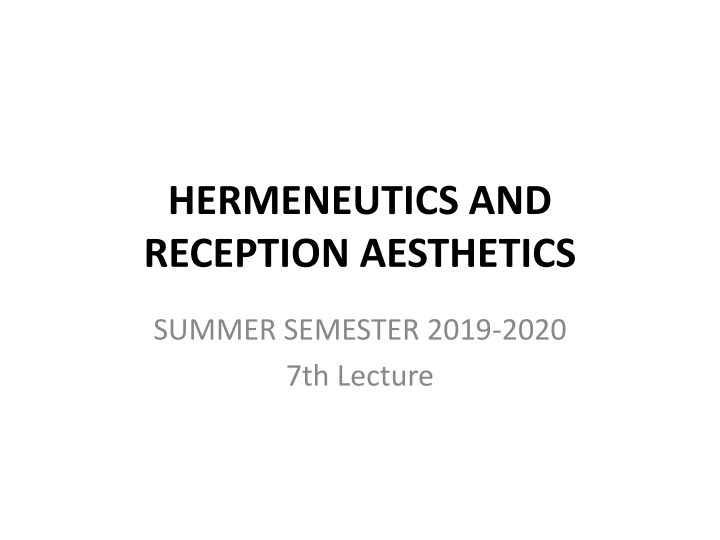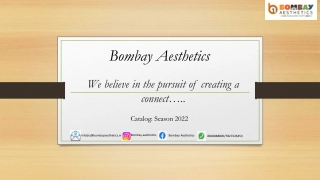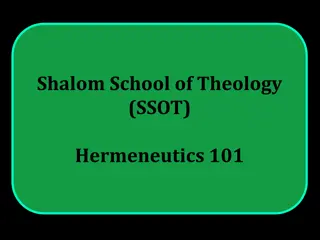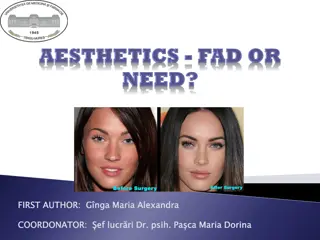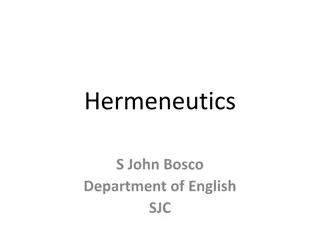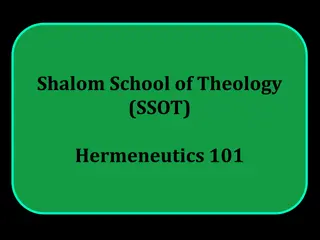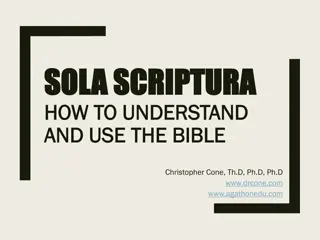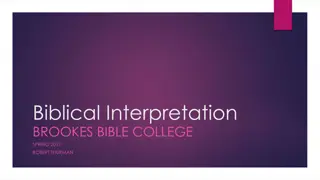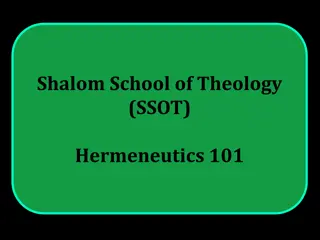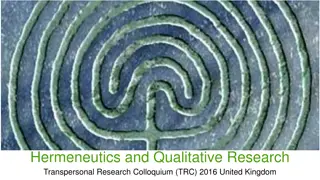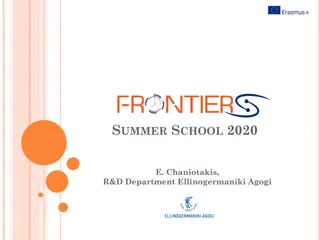Hermeneutics & Reception Aesthetics Summer 2019-2020 Lecture 7 Recap
In this lecture, the importance of prejudices in understanding texts is explored, emphasizing the need for interpreters to be aware of their biases. The historical context of prejudices during the Enlightenment era is discussed, shedding light on the negative connotations attached to this concept. A theory of hermeneutic experience is outlined, highlighting the key factors influencing interpretation. Through a critical lens, the lecture challenges traditional methods and encourages a more conscious approach to understanding texts.
Download Presentation

Please find below an Image/Link to download the presentation.
The content on the website is provided AS IS for your information and personal use only. It may not be sold, licensed, or shared on other websites without obtaining consent from the author.If you encounter any issues during the download, it is possible that the publisher has removed the file from their server.
You are allowed to download the files provided on this website for personal or commercial use, subject to the condition that they are used lawfully. All files are the property of their respective owners.
The content on the website is provided AS IS for your information and personal use only. It may not be sold, licensed, or shared on other websites without obtaining consent from the author.
E N D
Presentation Transcript
HERMENEUTICS AND RECEPTION AESTHETICS SUMMER SEMESTER 2019-2020 7th Lecture
Recapitulation of the previous 5thand 6thlectures 1. The problem of method critique of preceding attempts of methodology of human sciences. better way is to proceed from the humanist tradition than from epistemological methodology cut off from the ideal of objective sciences 2. Four concept of the humanist tradition: Bildung, sensus communis, judgment, taste Kantian depreciation of their cognitive value
Elements of a theory of hermeneutic experience See: H.-G. Gadamer, Truth & Method, p. 267- 306. Three main concepts constituting the conditions of possibility of hermeneutic experience, three factors accompanying every experience which has a hermeneutic character.
1. Prejudices as conditions of understanding In executing hermeneutic experience, an interpreter should not seek neutrality (approach of objectivist sciences, a kind of extinction of one s self ). But he should be aware of and make aware of his own fore-structure of understanding, i.e. his prejudices. In contrast to traditional approach, Gadamer argues that one should not remove one s prejudices (pre-opinions) from one s way but realize them and take them into account.
The important thing is to be aware of one's own bias, so that the text can present itself in all its otherness and thus assert its own truth against one's own fore-meanings. ( ) understanding will be concerned not merely to form anticipatory ideas, but to make them conscious, so as to check them and thus acquire right understanding from the things themselves. This is what Heidegger means when he talks about making our scientific theme secure by deriving our fore-having, fore- sight and fore-conception from the things themselves , W&M, p. 272
(1) The Enlightenment The concept of the prejudice gained its negative meaning not before the modern times. Era in which no other meaning of the prejudice than that of unfounded claim was adopted. A general tendency of the Enlightenment is to accept no authority and to decide everything before the judgment seat of reason. The critique of religion and Scripture. Against the authority and dogmas.
The Enlightenment doctrine of prejudice (a basic distinction): 1. the prejudice due to human authority and 2. that due to overhastiness. Either the respect we have for others and their authority leads us into error, or else an overhastiness in ourselves , p. 274. Ren Descartes (1596-1650) as a fore-father of the Enlightenment (See 2nd lecture)
(2) The romanticism Era which comes after the Enlightenment and can be understood as a reaction to it. At this time, the historical consciousness came up. Historical consciousness A discovery of the diversity of the various historical periods. J. G. Herder, G. W. F. Hegel It no longer measures the past by the standards of the present, as if they were an absolute, but it ascribes to past ages a value of their own and can even acknowledge their superiority in one respect or another , T&M, p. 276.
Romanticism made effort to go back to mythical consciousness. Being aware of the fact that it was no longer possible, it sentimentally looked back to the lost mythical world. the Gothic Middle Ages, the simplicity of village life (ancient habits, fairy tales, etc.) assumption of a mysterious darkness is as dogmatic as Reason of the Enlightenment The main mistake of romanticism: it attributes objective status to past eras, while ignoring the position from which it assesses. Assumption of the neutral/objective position.
(3) Gadamerian hermeneutics The effort of the Enlightenment to overcome all prejudices shows itself as a prejudice. Prejudices: historical realities belong to us inherently; they belong to our historical situation (=history does not belong to us, but we belong to history) That is why the prejudices of the individual, far more than his judgments, constitute the historical reality of his being , T&M, p. 245.
It is necessary not only to analyze the given text but also to reflect the position from which the reader/recipient it interprets. The position of the interpreter is not an innocent one; it is determined by prejudices (tradition) of the culture to which he belongs. The reading itself is always determined by concepts that cannot be removed from the historicity and put into a neutral objective realm.
Read: H.-G. Gadamer, The discrediting of prejudice by the Enlightenment, in Truth and Method, p. 273-277.
1b/ The Concept of Authority and Tradition Authority as a paradigmatic example of the prejudice. The Enlightenment tried to delimit an unprejudiced field against all kind of authorities (above all against the authority of the Church). To accept any authority means to give up reasoning. Gadamer goes against this view: it cannot be said that the acceptance of authority is based on abdication of reason.
Authority = someone (or something) who has better insight and therefore we accept him. We rely on his judgment, not by reason, but rather by emotion. Authority cannot be avoided. There is no such a rationalist who could consistently reject all authorities and pursue only the rules of reason. An example of the authority one cannot avoid and by which one is fundamentally delimited is TRADITION. E.g. language, education, habits: by means of these phenomena we perceive and think the world.
Tradition is a nameless authority which is valid without justification; retains its legitimacy beyond rational reasons and largely determines our creations and behaviors; rarely disappears completely. Most often, it is preserved in the further historical process of other periods of time. Every culture makes use of tradition and develops itself due to tradition ( utopias absolute cut off from traditions)
Hermeneutic awareness of the fact that we always dwell in some tradition(s). If we deal with texts from another historic era, if we try to understand them, we must take into account our own tradition. When reading a foreign text, we can better understand our own tradition we belong to.
Gadamerian comparison of the tradition of human and natural sciences the way human sciences work is inseparable from authority and tradition the idea of progress present in natural sciences Read: Truth & Method, p. 283-285. Cf. Thomas S. Kuhn, Structure of Scientific Revolutions, Chicago Press 1962.
Read: H.-G. Gadamer, The Rehabilitation of Authority and Tradition, in Truth and Method, p. 277-284.
